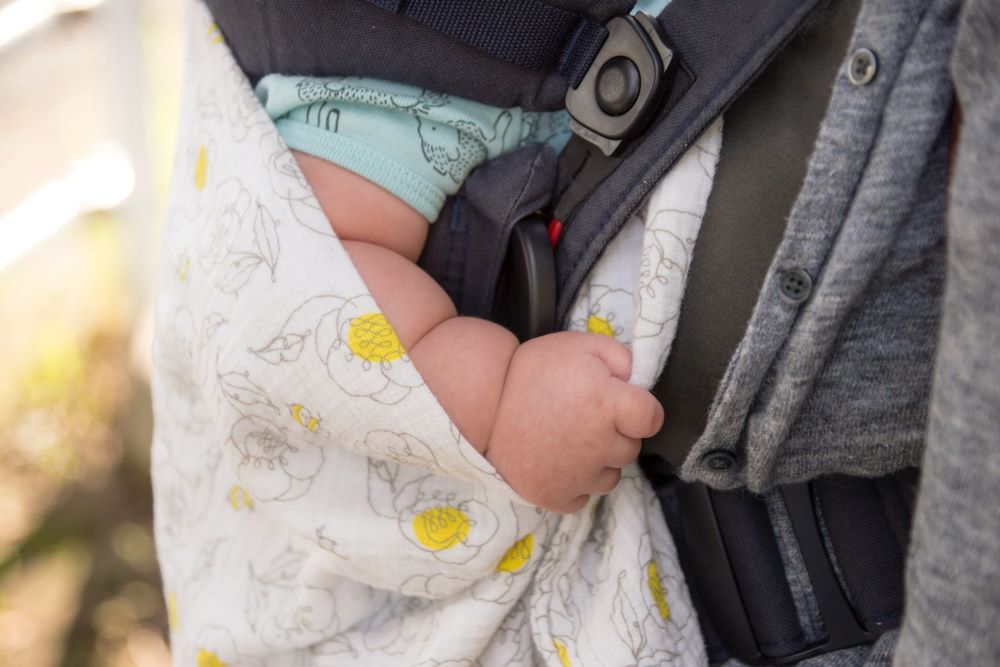
(Unsplash/Al Soot)
"¡Veo su pelo!" I cried out to the screaming young woman whose hand was clasped in mine. I see his hair.
"¡Veo su oreja!" I exclaimed a few seconds later. I see his ear.
And then, as the obstetrician lifted the newborn child into the air, I wept. I don't know what I was expecting, but the sight of a new person just arrived in this world was beyond anything I'd ever imagined. As I watched the new mother laugh in delight as she cradled him in her arms, I knew that I had just witnessed something beyond the scope of my everyday concerns, something deeply connected to the mystery of existence itself.
God undoubtedly has a sense of humor. The fact that I, a 38-year-old single woman who never expected to see the inside of a delivery room, ended up accompanying a mother through childbirth seems like a divine joke. Perhaps the bigger joke was my befuddlement as I attempted to strap an infant's car seat into the back of my vehicle. And yet, I've been privileged to interpret for mothers giving birth (followed by baby-Uber-driving and interpreting at pediatric appointments) four times in the past year.
Advertisement
The journey that led me to become a volunteer interpreter for Spanish-speaking mothers began nearly five years ago, when Donald Trump's hardline immigration policies made me determined to work for immigrants' rights. In early 2017, as I watched the newly inaugurated president sign order after order calling for travel bans and walls, I was overcome by my own smallness, the helpless feeling that there was nothing I could do.
But with the help of a dear friend who'd started interpreting for an agency that provides undocumented immigrants with free legal services, I realized there was indeed something I could do. Spanish-speaking immigrants from the Northern Triangle of Guatemala, El Salvador and Honduras — a region facing ongoing poverty and violence as well as consequences of the U.S. War on Drugs — were arriving in increasing numbers to our small Midwestern city. In a community where most people are monolingual English speakers, the skills of bilingual Spanish-English speakers were needed to support these newcomers.
Volunteering with a local nonprofit, Dubuque for Refugee Children, I eagerly put my language skills to use, accompanying Spanish-speaking immigrants to legal and medical appointments, interpreting at seminars organized to inform them of their rights and, in one case, tutoring a young mother as she completed her high school education. When I learned that some of these young people needed U.S. citizens to act as their legal guardians while applying for Special Immigrant Juvenile Status, I eagerly stepped into the role.
Over time, relationships deepened. Some young women who had come to know me asked me to accompany them first to their maternal health appointments, then to the delivery room and then to their children's pediatric appointments. "Honored" is an understatement when I describe my emotional response to these requests.
The principles of solidarity and subsidiarity so central to Catholic social teaching remind us that we can act in our own communities as well as more broadly.
Among the ongoing debate over reproductive rights in the U.S., I believe that more than ever, pro-life and pro-choice advocates need to seek common ground. As Charles Camosy argued in America last summer, the most obvious way to do this is to support mothers. Pro-life advocates — particularly Republican ones — often face the criticism that they are "pro-birth" but not truly pro-life because they rarely support policies that will help children after they are born, particularly if born into poverty and marginalization. Meanwhile, in refusing to question the premise that a fetus is not a person with rights, many pro-choice advocates dismiss philosophical discussions about personhood that deserve consideration. But common ground for both sides can be found in supporting mothers before, during and after the process of giving birth.
In Luke's Gospel, the pregnant Mary visits her cousin Elizabeth and greets her with an impassioned statement of faith in a God who "has thrown down the rulers from their thrones but lifted up the lowly. The hungry he has filled with good things; the rich he has sent away empty. He has helped Israel his servant, remembering his mercy" (2:52-54). With this powerful Magnificat, Mary prophesies the mission of justice and mercy that her son Jesus will bring to the world — a mission that all who follow him are called to continue.
How do we do this? One response lies in voting and advocating for more just policy. Paid family leave, universal health care, poverty reduction and other policies that help the most vulnerable in the U.S. and abroad are an important piece of this puzzle.
However, advocacy for justice can also be combined with direct charity. Nearly 90 years ago, Dorothy Day and Peter Maurin founded the Catholic Worker movement with the firm belief that people should care for one another rather than waiting for institutions to do so. The principles of solidarity and subsidiarity so central to Catholic social teaching remind us that we can act in our own communities as well as more broadly.
Whether we live in large cities or small rural communities, we can try to get to know our neighbors and be mindful of those who might need our help. If we know a single mother, we can buy her diapers, offer as gifts our own children's outgrown clothes or babysit her kids so she might enjoy a much-needed evening out. We can be more open to sharing our adult spaces — whether offices, professional meetings, college classrooms, restaurants or churches — with small children. Perhaps, if we have a spare bedroom at home, we might provide free or low-cost temporary housing to a mother and baby in need. There is always something we can do.
As the new year begins, I am happy to report that the four infants whose births I witnessed are all happy and healthy. While their mothers face particular challenges, they are handling them through their own hard work combined with family and community support. A few friends have asked me if the experience of accompanying these women makes me want a child of my own. With a smile, I reply that it makes me want a better world for children to be born into. In working to build such a world, we can all become truly pro-life.






